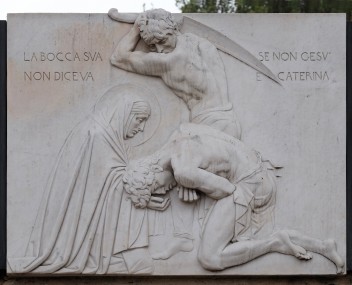
Catherine knew she had to go to the prison. The man who was sentenced to die the next morning was in a fury. He assaulted anyone who entered his cell. The ridiculousness of his unjust conviction had enraged him to madness. The priests would enter to hear his confession and then hurriedly rush back out the door, contented that they had done their duty to at least try, but relieved that they had escaped relatively intact.
Catherine’s love for this unfortunate man she had yet to meet—and her love for God—drew her to the peripheries of her city, to this desolate place. No one, including the jailer, would turn her back. This woman, who would convince Pope Gregory XI to leave the safety of Avignon and return the papacy to a very dangerous Rome, was not to be contravened by any jailer. And so, the door was unlocked and she entered.
We don’t know the prisoner’s reaction to seeing St. Catherine of Siena enter his cell. We don’t know their conversation. But we do have the briefest of summaries from Catherine herself, included in a letter to her spiritual director: “He received such strength and consolation from my visit that he went to confession and prepared himself well.”[i] While a final reconciliation with God was indeed Catherine’s great hope, something else truly beautiful also emerged from this encounter. “He had just one fear, namely, that he might not be strong enough when the moment came…” The shadow of his coming execution and death had nearly overwhelmed him. He turned in his need to Catherine and “he asked me to promise, for the love of God, that I would be with him when the time of execution came…He kept saying, ‘Stay with me and don’t leave me; then I shall be fine, and I shall die content.’”
The next morning, after receiving Holy Communion for the first time, he was led to the streets on his way to execution. In this moment, Catherine turned to him and said, “Courage, my dear brother; we shall soon be at the wedding feast. You will go there bathed in the sweet blood of God’s Son, and in the sweet name of Jesus. Never forget this.” And then, she reminded him of her promise, “I shall be waiting for you at the place of execution.” With this reminder of Catherine’s presence with him, “his heart lost all its fear, his face changed from sadness to joy and he rejoiced and exulted, saying, ‘How have I received so much grace that my soul’s delight will be waiting for me at the holy place of my execution?’ (He had been given so much light that he could call the execution place ‘holy!’) And he added, ‘I shall go joyfully and courageously, and it will seem like a thousand years until I get there, thinking that you will be there waiting for me.’”
While Niccolo was paraded through the city, enduring the jeers of the Sienese people, Catherine walked briskly to the place of execution to await him. Her depth of friendship—and desire to accompany him—caused her to resist any impulse to distance herself from this experience. Instead, she knelt down and put her own neck on the block as she prayed “for the grace that I wanted, namely, that I might give him light and peace of heart at the moment of death, and then see him reach his goal.”
And then, the sound of the execution parade reached her ears. She looked up and “he arrived, like a meek lamb, and when he saw me he began to smile. He asked me to make the sign of the cross over him, so I blessed him and said, ‘Down to the wedding feast, my gentle brother. You will soon be in everlasting life.’” Even now, Catherine did not step back. She knelt down again in solidarity, cradled his cheeks in her hands, and as he gazed into her eyes, he murmured “Jesus” and “Catherine” as he was violently ushered into eternity.
This is Christian friendship. It is self-giving, persevering through every fear. Christian friendship is that category of friendship that is animated by a transforming grace, empowering a fidelity and a love that exceeds our natural capabilities. And, as such, it is a foretaste of the intimate communion of friendship that will be enjoyed for all eternity by those who by grace enter the Kingdom of Heaven. For “God himself is an eternal exchange of love, Father, Son and Holy Spirit, and he has destined us to share in that exchange” (CCC par. 221).
Dr. James Pauley is Professor of Theology and Catechetics at Franciscan University of Steubenville and author of the book Liturgical Catechesis in the 21st Century: A School of Discipleship (Liturgy Training Publications, 2017).
Note
[i] All citations from this letter come from L 273, DT XXXI contained in Catherine of Siena: Passion for the Truth and Compassion for Humanity, Mary O’Driscoll, OP, ed. (Hyde Park, NY: New City Press, 1993), 41-43.
This article originally appeared on page 5 of the printed edition.
Art credit: Relief of Saint Catherine of Siena near Sant Angelo ©Shutterstock.com
This article is from The Catechetical Review (Online Edition ISSN 2379-6324) and may be copied for catechetical purposes only. It may not be reprinted in another published work without the permission of The Catechetical Review by contacting [email protected]


















